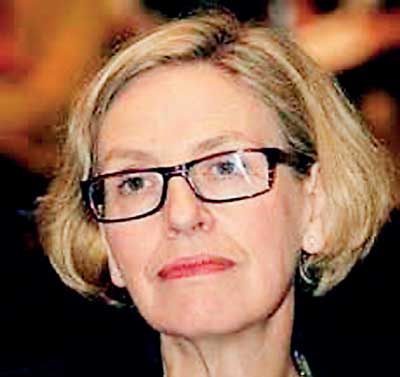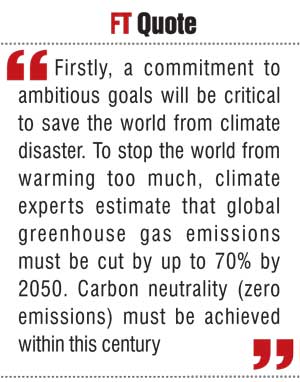Tuesday Feb 17, 2026
Tuesday Feb 17, 2026
Monday, 7 December 2015 00:00 - - {{hitsCtrl.values.hits}}
By Annette Dixon
The mountain kingdom of Bhutan may not seem an obvious place to look for lessons on addressing climate change. But on a recent visit here I was impressed with how much this small country has achieved and also with its ambition. Bhutan has much to teach South Asia and the wider world.
These lessons are especially relevant as the world negotiates in Paris a new pact on climate change at the International Climate Change Summit, known as COP21, which we all hope will move the global economy to a low carbon and more resilient path.
The talks aim to agree this month on a way to keep global warming to a maximum of two degrees celsius from pre-industrial era levels. There is widespread agreement that going above this threshold would have serious consequences.
South Asia is among the regions of the world that is likely to be most affected by climate change. We are already experiencing this. There is increasing variability of the monsoon rainfall, more heavy rainfalls such as those that caused the recent flooding in India, and an increase in the number of droughts.
A World Bank report in 2013 predicted that even if the warming climate was kept at two degrees then this could threaten the lives of the millions of people in South Asia. The region’s dense urban populations face extreme heat, flooding, and disease and millions of its people could be trapped in poverty. Droughts could especially affect north-western India, Pakistan and Afghanistan.
These are big problems. They may look much bigger than anything Bhutan, a very small country in a populous region, can teach South Asia and the world. But I see three lessons.
Firstly, a commitment to ambitious goals will be critical to save the world from climate disaster. To stop the world from warming too much, climate experts estimate that global greenhouse gas emissions must be cut by up to 70% by 2050. Carbon neutrality (zero emissions) must be achieved within this century.
Bhutan declared in 2009 that it would remain carbon neutral and has made the most ambitious pledges on cutting emissions at COP21, according to Britain’s Energy and Climate Intelligence Unit think tank. It is carbon neutral already because of its vast forests absorbing carbon emissions. But staying neutral as emissions from industry and transport rapidly rise will not be easy. It will require aggressively maintaining its tree cover and finding ways to grow economically in a carbon neutral or reduced way. To achieve this, the Royal Government of Bhutan has embedded its commitment to maintain its forest cover at more than 60%.
Secondly, mainstreaming comprehensive climate change measures across the economy is the way to go. The alternative of a case-by-case approach will result in gains in one area that are negated by setbacks in others. For example, there is no point in building a solar park with photovoltaic cells that are manufactured in a factory powered by coal.
Bhutan has taken the approach of mainstreaming climate change and resilience in policies on disaster risk management and weather monitoring, water-related services, agriculture, urban transport, Information and communications technology (ICT), hydropower, and forest management. In ICT, for example, Bhutan is positioning itself as the country of green, reliable energy to attract private green investment and jobs.
Thirdly, there are big potential wins in the fight against climate change from cooperating with neighbours. This could even save lives. With the earth warming, the number of natural disasters is increasing. In the past two decades, over 50% of South Asians (more than 800 million people) have been affected by at least one natural disaster. South Asian countries can gain from cooperating on disasters that stem from shared climate change-related challenges.
When I was in Bhutan I announced a new weather and disaster improvement project to expand weather forecasting and natural disaster early warning in Bhutan and the South Asia region. I also announced a pilot program for climate resilience that has the potential for considerable expansion.
Climate change is the defining challenge of our era. But an approach that includes a commitment to ambitious goals, mainstreaming climate change measures, and cooperating with neighbours, could lead to real progress.
(The writer is Vice President for the South Asia region at the World Bank).